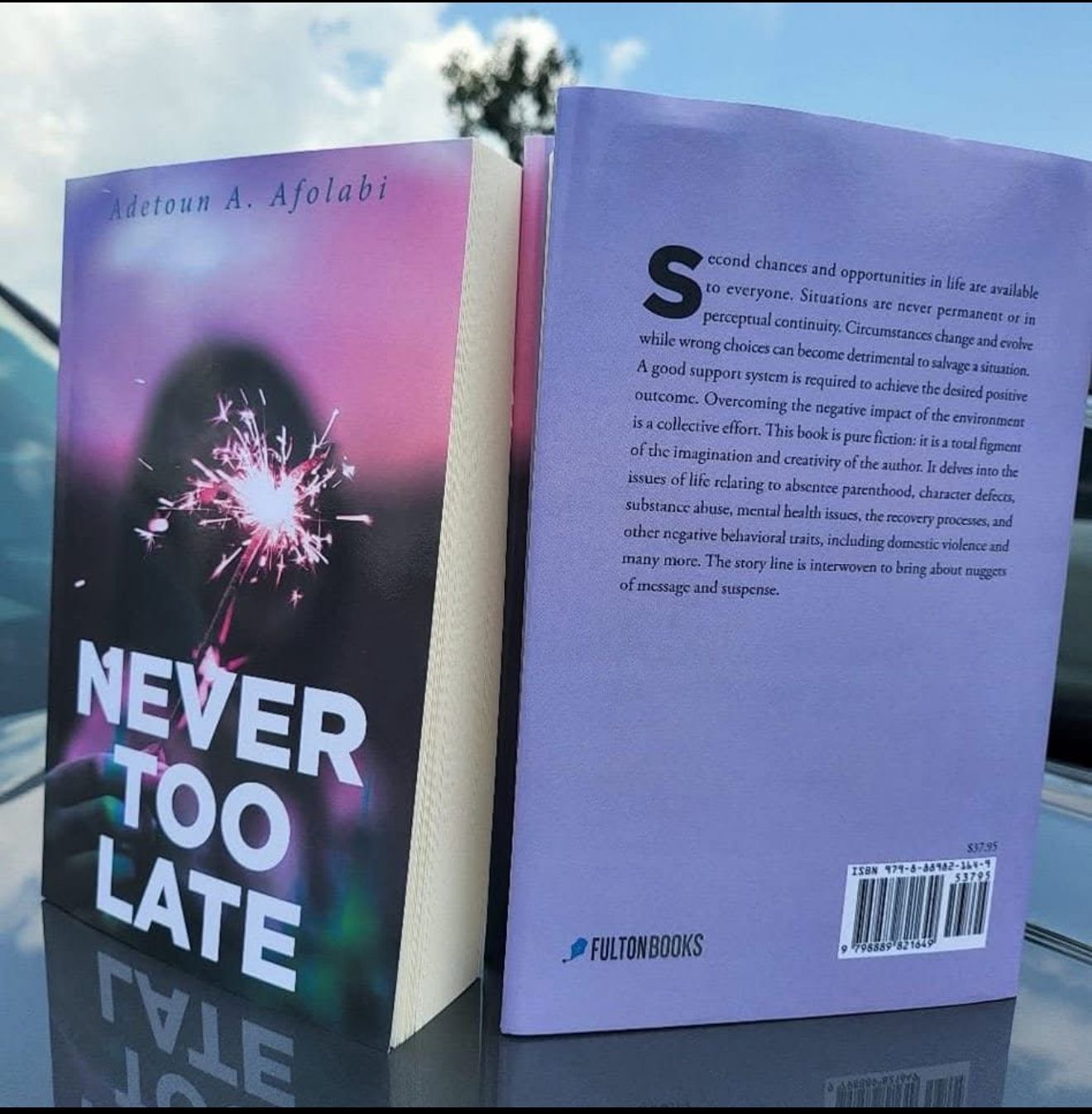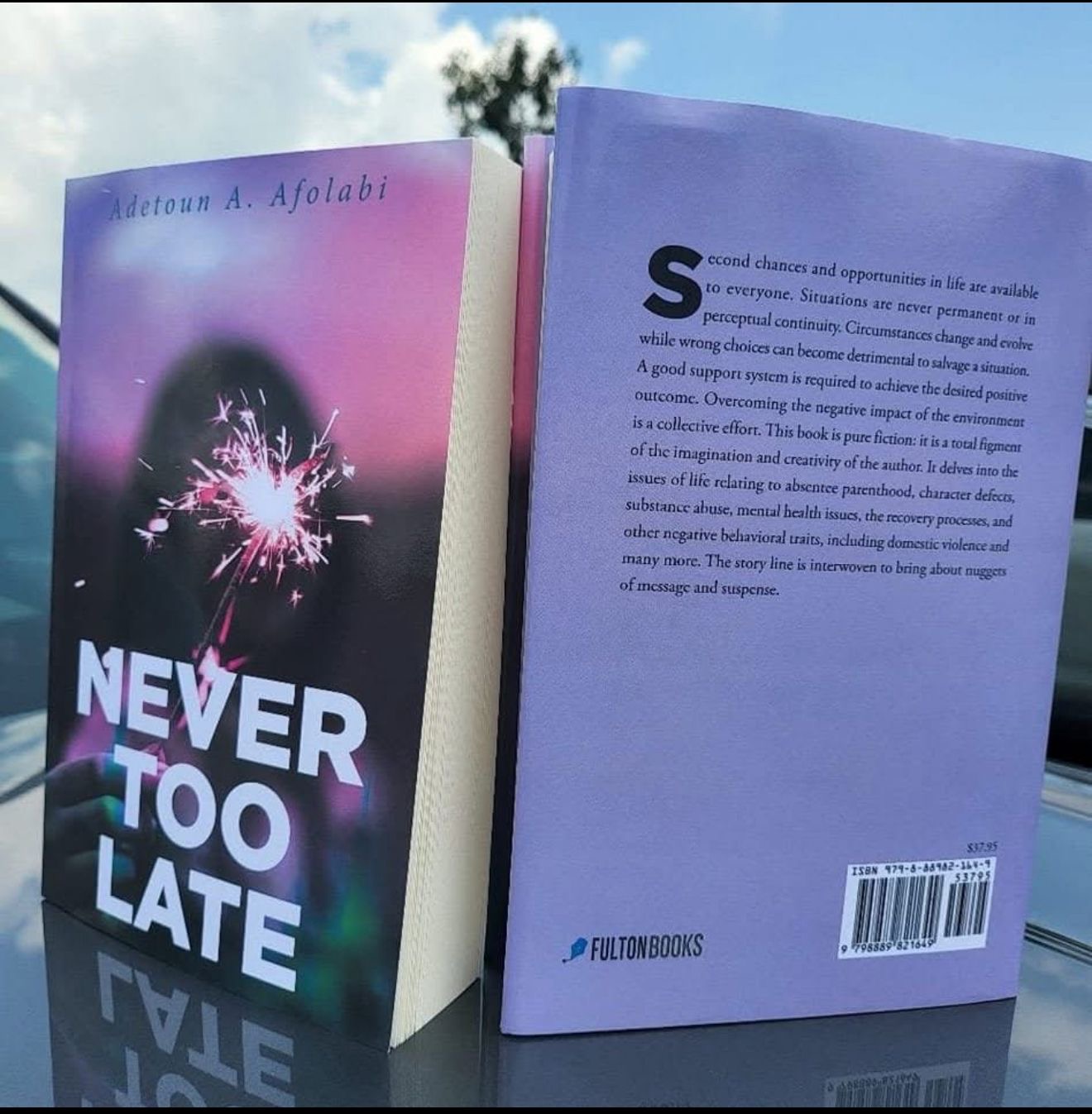 In a compelling and deeply humanizing segment of Channels Book Club, host Alaka Kasumo sits with Adetoun Afolabi—author, counselor, therapist, and certified addiction professional—to explore her riveting novel Never Too Late. The interview goes far beyond a literary conversation; it blossoms into a socio-psychological case study of adolescent trauma, privilege, mental health, and redemption. What unfolds is an extraordinary literary moment—an interweaving of fiction, lived realities, and clinical truth.
In a compelling and deeply humanizing segment of Channels Book Club, host Alaka Kasumo sits with Adetoun Afolabi—author, counselor, therapist, and certified addiction professional—to explore her riveting novel Never Too Late. The interview goes far beyond a literary conversation; it blossoms into a socio-psychological case study of adolescent trauma, privilege, mental health, and redemption. What unfolds is an extraordinary literary moment—an interweaving of fiction, lived realities, and clinical truth.
Adetoun Afolabi transcends the conventional role of novelist in her profound work, Never Too Late, emerging instead as a narrative healer wielding literature as both scalpel and salve. This is not merely fiction; it is a meticulously crafted psychosocial intervention, a confluence of literary artistry and clinical acuity that positions African storytelling at the vital intersection of human suffering and potential redemption. Grounded in the stark realities of adolescent trauma, addiction’s insidious grip, corrosive peer influence, and the silent fractures within family structures, Afolabi’s narrative functions as a masterclass in understanding the human condition.
The novel’s core unfolds through the diverging trajectories of young women—Francine, Gina, Ella, and Elizabeth—each sculpted by distinct, often hidden, familial environments and the immense gravitational pull of peer dynamics. Francine, navigating adversity and mistreatment, ultimately ascends as a beacon of resilience, a “star” forged in hardship. Her counterparts, initially positioned as antagonists, spiral into the devastating vortex of substance abuse, depression, and profound mental deterioration. Afolabi masterfully renders the cascading consequences of adolescent choices, demonstrating with visceral clarity how seemingly isolated decisions reverberate across entire lifespans, etching futures defined by either ruin or reclamation. Central to this exploration are the toxic alchemies of peer pressure, the deceptive facades of socioeconomic privilege masking profound dysfunction, the insidious decline of mental health catalyzed by substance use, and the arduous yet attainable paths toward self-awareness, resilience, and ultimate redemption.
Afolabi’s authority is singular. As a certified addiction professional and dual-diagnosis counselor, her portrayal of addiction and co-occurring mental illness carries an unmatched authenticity. The novel ascends beyond compelling narrative; it operates as a clinical treatise artfully disguised within fiction. She dissects critical, interwoven health themes with precision. Her narrative irrefutably illustrates the perilous progression where adolescent experimentation with drugs and alcohol metastasizes into entrenched psychiatric disorders—a progression tragically amplified in contexts like Nigeria, where scarce resources and pervasive stigma cripple early intervention. The novel’s thesis resonates with clinical gravity: “The choices you make determine the outcome of your life.” Afolabi meticulously explores the “choice architecture” of adolescence, particularly within the crucible of peer influence, affirming the adage “Friends can make or destroy you” not as mere caution, but as an empirically validated risk factor in developmental psychology and addiction medicine.
Sociologically, Afolabi delivers a revolutionary critique. She deftly deconstructs the fallacy equating dysfunction solely with poverty. The antagonists—Gina, Ella, Elizabeth—hail from “rich, privileged families… but also from deeply dysfunctional homes.” Their pathology stems from emotional absence, neglect, and the suffocating void where material abundance substitutes for genuine connection and guidance. This incisive challenge to classism and the exposure of emotional neglect amidst privilege marks a significant, necessary departure in African literary discourse, shifting the lens to the universal vulnerabilities festering beneath surface prosperity.
The very title, *Never Too Late*, resonates as a powerful existential mantra, weaving through the narrative and Afolabi’s own philosophy. It embodies the core message of boundless potential for transformation: redemption remains perpetually accessible; life’s trajectory admits correction at any juncture; mental wellness is not a static destination but a continuous, intentional journey. “Learning does not end until we enter the grave… As long as we are on this planet, we can begin to work on ourselves,” Afolabi asserts, echoing Viktor Frankl’s logotherapy and aligning seamlessly with cognitive-behavioral principles emphasizing agency, reflection, and the possibility of redemptive self-reinvention.
Recognizing the novel’s potent pedagogical and therapeutic utility, Afolabi explicitly advocates for its integration across educational strata, from middle school to tertiary institutions. This vision aligns perfectly with preventive adolescent health paradigms and psychosocial learning frameworks. *Never Too Late* possesses the transformative capacity to function as a vital curriculum resource, a therapeutic guide within rehabilitation settings, an invaluable training tool for social workers and clinicians navigating addiction and trauma, and a crucial catalyst for dialogue within parent-teacher associations confronting youth vulnerability.
Ultimately, Afolabi has forged more than a novel; Never Too Late, is a clarion call for national mental health reform, particularly within a continent where silence still shrouds these critical issues. It is a testament to the potent fusion of art and advocacy, where storytelling becomes the vehicle for scientific truth and societal healing. This work stands as an indispensable contribution, demanding recognition not only within African literary canons but also across the global academic and clinical landscapes dedicated to understanding addiction, trauma, resilience, and the enduring power of the human spirit to choose redemption. Its layered narrative, cinematic potential, and profound interdisciplinary relevance cement its status as essential reading for scholars and practitioners in literature, psychology, social work, public health, gender studies, and beyond—a landmark work where narrative mastery meets clinical necessity, illuminating the path from darkness toward the ever-present possibility of light.
Reviewed by Jide Adesina, publisher/Author Between Borders: Lost in the Shadows of a Cold Country.


